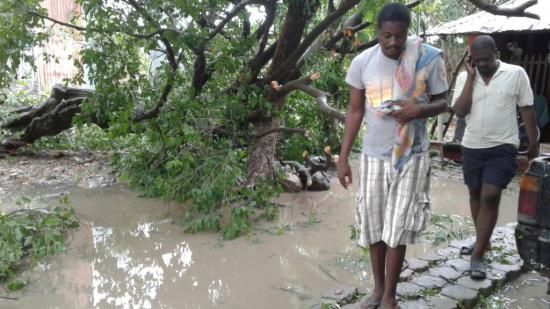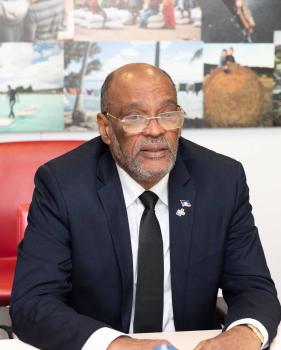
Escalating gang warfare, political instability, disease and a string of natural disasters have brought Haiti’s social order to the breaking point, CNN and the global Christian humanitarian organization World Vision reported this week. Christian aid groups in Haiti are struggling to provide help whenever and wherever possible, but they face a “cataclysmic situation,” according to the UN Human Rights Office.
Haiti is the poorest country in the western hemisphere and has been plagued by chronic political instability, social unrest, foreign intervention and numerous natural disasters for more than two centuries.
A recent increase in gang violence has exacerbated these long-standing problems. Consequently, Haitian Minister Ariel Henry announced his impending resignation in mid-March, CNN explained.
Henry said he will resign once a transitional council is established and a new prime minister and cabinet are named. He added that his government will remain in a caretaker capacity until that time.
“As of March 2024, the crisis in Haiti has reached unprecedented levels due to widespread gang violence,” according to World Vision. “As many as 5.5 million people, including 3 million children, are in urgent need of humanitarian aid.”
“The country, which was already facing political instability and a cholera epidemic, is experiencing intensified impacts like food shortages and limited access to basic services,” the organization said.
Rival Gangs Kidnapped Hundreds
In recent months, rival gangs have kidnapped hundreds of Haitians as well as aid workers in large numbers, seized control of water and fuel resources in some areas, and taken control

July, 18 2023 /European Union, 2024, CC BY 4.0, CC BY 4.0, via Wikimedia Commons.
of areas where an estimated one million children live.
Within the last three years, the nation has been rocked by several major crises including these:
- COVID-19 pandemic
- The assassination of President Jovenel Moise in July 2021
- A 7.2 earthquake that caused 2,200 deaths and mass destruction in August 2021
- Repeated cholera outbreaks including one in 2022
- Torrential rains and flooding in November 2023
The country also continues to recover from a 7.0 earthquake that killed 300,000 people in 2010 and a category 4 hurricane in 2016.
World Vision reported last week that 15,000 Haitians have lost their homes since Feb. 29, bringing the total number of refugees to 362,000. And, UNICEF said some 125,000 children are facing severe malnutrition.
2 In 3 Children Need Humanitarian Aid
“Hundreds of thousands of children and their families live in some of the most dangerous and besieged communes,” Catherine Russell, UNICEF executive director, said last month. “A shocking 2 in 3 children need humanitarian aid in Haiti.”
Christian aid groups in Haiti have faced increasingly serious obstacles since gang members kidnapped 17 missionaries from Christian Aid Ministries in October 2021, the Associated Press said. Five of the hostages were released, and the remaining 12 escaped after a two-month ordeal.
The Los Angeles Times called it “the largest kidnapping of its kind in recent years, though hundreds of abductions have targeted Haitian nationals and drawn scant international attention.”
Several Christian Aid Ministries’ workers have returned to Haiti to assess the situation, but the organization has not made plans to permanently return, spokesman Weston Showalter told AP. In the meantime, the organization’s local staff is providing limited assistance to Haitians.
“There’s not a clear path forward,” according to Alex Morse, deputy regional director for Latin America and the Caribbean for Church World Service (CWS). CWS, which provides global disaster relief and sustainable responses to people in need, consists of more than 30 Christian denominations and communions.
Humanitarian Groups Reduce Services
CWS reduced its assistance to Haiti following the kidnapping – as have numerous other Christian aid organizations. However, its local staff continues to operate agriculture, food security, housing construction and social support programs.
The Baptist Haiti Mission, United Methodist Committee on Relief, Haiti Foundation of Hope, Catholic Relief Services and other Christian aid groups in Haiti have reduced services including distribution of food, clothing and medicine and emergency relief.
But there was one ray of light in late March. Two nonprofits – the Christian-based Tim Tebow Foundation and the Sentinel Foundation — worked with U.S. Rep. Cory Mills of Florida to rescue 59 disabled children from Haiti. They relocated the children to Jamaica.
“The two foundations joined forces to provide operational support and funding with guidance from Mills, who has staged two other rescue operations from Haiti as the country’s crime crisis remains severe,” Fox News reported on March 24.
Tebow said all 59 children were out of danger. The former football star established the nonprofit Tim Tebow Foundation in 2010 to help marginalized people worldwide. The Sentinel Foundation, which is also nonprofit, consists of veteran commandos and “targets traffickers, protects children, and provides crisis response,” according to its website.
World Vision continues to provide humanitarian aid including food, clean water and psychosocial support to Haitians. It also advocates for cross-border operations to protect women, children and families fleeing Haitian violence.
The organization reports that as of March 2024, nearly 10,000 people have received access to clean water; nearly 16,000 have participated in hygiene promotion programs; nearly 22,000 children have received nourishing school meals; more than 300 households have received agricultural assistance in the form of livestock, seeds and tools; nearly 223,000 Haitians have gotten preventative messages about sexual exploitation and abuse, as well as strategies for coping with those traumas; and nearly 10,000 have benefited from primary healthcare services.
But much more needs to be done by Christian aid groups in Haiti and other relief organizations. “While the outside world struggles to get help into Haiti, the country itself has no internal resources to fill the gap,” according to ODI, an independent think tank. “Whatever happens next, this vulnerability has to be tackled — not just to address the immediate crisis, but long-term.”

